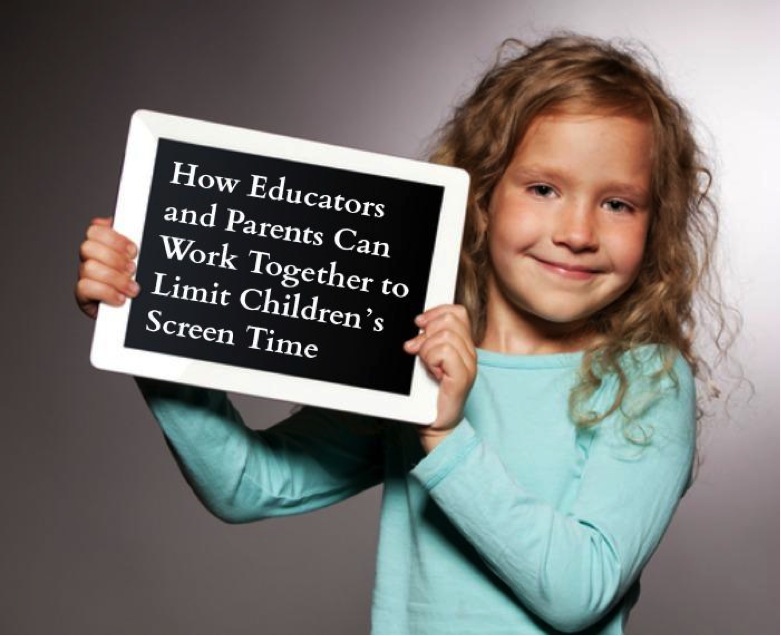Guest Blog by Tara Heath – Educators and Parents Can Work Together to Limit Children’s Screen Time


“New Technology is common, new thinking is rare.” – Sir Peter Blake

When it comes to technology and education, what is best for the next generation? Studies are finding that limiting children’s time in front of the TV, computer, and smartphone may have substantial health and developmental benefits.
Limited Screen Time Means Improved Well Being
A recent study published in JAMA Pediatrics found that children get better grades in school, report improved sleep, exhibit better classroom behavior, and notice additional health benefits when parents limit the time they spend in front of their electronic devices.
Well, if this is the case, why aren’t all parents monitoring their kids’ Internet use? According to Professor Douglas Gentile, the effects aren’t immediate. You might have to wait up to eight months to notice the improvements in your teenager’s behavior. However, once the good habits take effect, they have powerful results.
So why do little changes correlate to big improvements? Apparently, restricted media exposure sets off a ripple effect. For example, children who spend less time “plugged into” devices sleep better. Better sleep in turn helps prevent childhood obesity, improves academics, and reduces behavioral issues.
When Should Kids Unplug?
“It is important to remember that educational software, like textbooks, is only one tool in the learning process. Neither can be a substitute for well-trained teachers, leadership, and parental involvement.” – Keith Krueger
The AAP suggests some simple strategies for keeping young children and adolescents balanced in the digital age:
Limit exposure – The organization recommends not allowing any screen time for children less than two years old. Furthermore, they advise no more than two hours for older kids. Their polls found that 13% of parents aren’t enforcing any electronic guidelines. Don’t be one of those parents. They may feel like they’re giving kids room to make their own decisions, but it can, and very often does, have a negative outcome.
Keep Devices Out of the Bedroom – Try to limit electronic use to designated, common areas. Avoid allowing kids and teens to store personal computers in their rooms. If you do decide to allow your children to have more browsing freedom, consider other forms of content monitoring. Exposure to graphic porn, the online bullying epidemic, and sexual peer pressures are reasons enough to enforce this rule.
Make Family Time Device Free – Dinner time, family outings, and other events should all be primarily void of electronics. In order to create this good habit, you might have to invent a “cell phone and tablet drawer,” bowl, or box and declare that no one can check their devices during bonding time. (This includes you, parents! Set a good example!) Your kids may groan and complain, but when they’re older, they’ll cherish the memories they made and forget about the Facebook time you “deprived” them of.
Remember, Many Kids Use Technology at School – Kids might have to use the Internet for projects and most likely utilize devices in the classroom. When your children ask you for one more hour in front of the computer, remind them that they also use devices at school, and that their electronics aren’t a playground, but a tool.
The Role of Schools

Although all schools are different, technology is rapidly becoming a big part of the classroom no matter what school you look into. It is important for parents to talk to their child’s teachers and find out the school’s beliefs about what role technology should play in education. Inquire about the amount of time students spend on electronic devices and get a better idea of the kinds of websites, databases, and social media platforms their teachers use. Knowledge is power! It will be harder to instill a sense of balance at home if your student is receiving mixed messages the rest of the day.
The more feedback schools receive from parents regarding screen time and technology, the more proactive they can be about the issue. When parents and educators work hard to communicate on a regular basis, it means better things are on the horizon for our children.
Encourage Extracurriculars
Kids spend a majority of their time each day at school. That being said, teachers are a big part of their lives! As a teacher, what you say holds a great deal of influence. During the school day, help your students get their minds off the screen and onto something else! Be supportive of the different clubs and sports offered around the school. Find out from the parents what their children enjoy doing so you have some direction when encouraging them to try new things.
Parent-teacher conferences are a great place to discuss creative outlets other than social media. Perhaps a parent mentions that their daughter spends too much time on celebrity gossip sites – suggest drama club! Are chat rooms a problem? Debate team could be a good fit! As the teacher, you have a greater depth of knowledge on extracurriculars going on at the school. Do your best to get on the same page with the parents and come alongside them to motivate and encourage their children.
Be Prepared For Backlash
Some of your teen’s friends will have parents that are lax about monitoring their time online. If your child throws this in your face, relax, take a deep breath, and have confidence in your parenting style. This is an even greater reason for parents and educators to join forces – a reduction of screen time in the classroom will more than likely overflow into home life, as well.
No matter what happens, remember that the positive effects might not be immediate, but someday you will notice a marked difference! You can do this!
Tara Heath is a freelance writer and journalist in Southern California. With two kids of her own, the topic of screen time is constantly on her mind. Follow her on Twitter for more!




